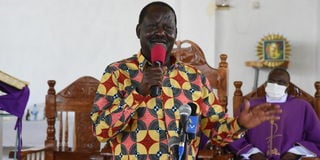Why politics is never going to leave Church

ODM party leader Raila Odinga speaks at St Stephen's Lwanya Catholic Church in Mundika, Busia County, on February 28, 2021 .
On October 31, 1517, a small-town monk, Martin Luther, protested against the Catholic Church in what would become the most defining church reformation. Henceforth, in classic paradoxical fashion, division and dissimilarities would be the nucleus of peace and sustenance among churches.
More than 500 years later, churches in Kenya seem to be divided on whether the pulpit can also serve as a dais for political bigwigs. While many corroborate that the pulpit is a holy place and should remain clear of political slander and pipe dream manifestos, the lack of commonality among churches to prevent politicians from accessing the pulpit seems to be exacerbating the slander and incessant politicking in churches’ holiest of grounds.
The cunning politicians are taking advantage of that to scout for congregations that are willing to offer them a listening ear.
Secondly, politicians understand the one thing that is tethered in society’s church fabric: Mythology. The church thrives in the belief of a bold idea (myth) that there is a promise of a better tomorrow, a better place far above, where milk and honey are the order of the day, a promise that one day this place will be made available to the righteous few.
Shrewd as they are, politicians have understood this power, the power of promise, and exercising it has been the hypnotic stick used in churches — even while still in a position to make the changes they promise. Consequently, churches find themselves in a moral quagmire, whether to let these politicians — who bear promises of a better tomorrow — misuse the pulpit.
Money also seems to be a determinant of ‘pulpit politicking’. While many churches will agree that money is the root of all evil, they may also quickly add that it is not so if donated to a church. Politicians understand that all too well and, therefore, splurge more than enough money to validate their presence on the pulpit.
Raking in profits
Churches have slowly turned into commercial entities with some high-end ones raking in profits that would make any CEO drool. With this in mind, a little slander on the pulpit in exchange for millions of cash from politicians is rendered a paltry mistake. After all, we are all sinners, aren’t we?
It is important for churches to draw commonality if this matter is to be resolved. The golden rule should be upheld: Churches are an extension of neither the government nor politicians.
The church ought to separate itself from the superficial political hype that surrounds politicians. A clear boundary should be demarcated: That the church does not recognise political ambitions, fame or popularity; that all congregants are equal, regardless of occupation, wealth or political class. The common denominator is faith.
Failure to do that, politicians will endeavour to disrespect the pulpit for their selfish political ambitions. But more than that, legitimate churches will turn to mediocre cash cow entities, where the Lord comes second to the loans.
Mr Maina, a communication and media student at Kenyatta University, is an intern at Nation Media Group. [email protected].





